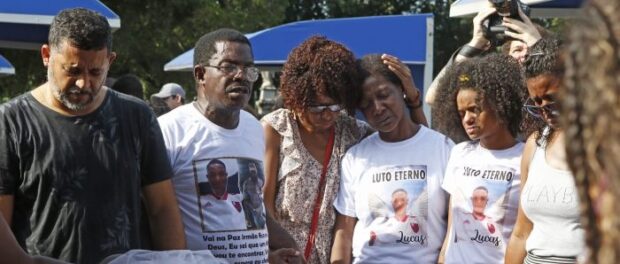
For the original article in Portuguese published by Redes da Maré click here.
On September 6 2019, Redes da Maré protested against the police operations in the Complexo da Maré favelas in Rio de Janeiro.
Violence is not normal…
The use of force against residents of the favelas is not normal…
State killing is not normal…
Living is normal…
It could have been just like any other Friday of any month or year. But it was September 6, 2019, the day that a group of children and adolescents, residents of the 16 favelas that make up Maré, accompanied by mothers and educators from Redes da Maré (Maré Development Networks NGO), went to the Bienal do Livro (Biennial Book Fair) at the Riocentro Convention Center, in Barra da Tijuca, Rio de Janeiro. This would be the first time many of them would participate in a literary event on the scale of the Biennial, where they would come into contact with an astounding number of books and authors. It would have been an unforgettable day, made all the more magical by fantastical new stories, if only it wasn’t jaded by incoming news on social media of yet another violent police operation in Maré: an intervention that would last throughout their time at the fair and into the middle of the night.
The fact is that, when the children returned to Maré at around 8:30pm, they were met with an ongoing armed confrontation, with people wounded and dead—a frightening scenario, and a stark contrast to the world of possibilities and discoveries the Biennial’s books had afforded them. To get to their homes, many were forced to sneak down backstreets and alleys, ducking behind cars and walls, walking as if they were in a minefield.
Absurdities such as the situation described above repeat themselves in every instance of warlike confrontation involving public security officials and armed groups in the favelas and peripheries.
The September 6 police operation in several parts of Maré—including Parque União, Rubens Vaz, Nova Holanda, and Parque Maré—began around 5:20am, continued through the day and ended around midnight. There were more than 19 hours of tension, fear, and armed confrontations, affecting the community by altering daily life, leaving marks, sadness, and pain over the feeling of impunity that characterizes these moments.
Two cultural events were canceled—the venue where one of the events would have been held was occupied by police; schools, health posts, churches and businesses were closed. In other words, residents were confronted with a reality in which they have to believe it is just part of life for those living in favelas. And we, tirelessly, continue to ask ourselves: what justifies such a long police operation, one that subjects an entire population to the fear and risk described above? Why does this violent, disrespectful, and cruel treatment of favela residents exist?
The police intervention left two residents dead, others injured, several reports of house invasions, assaults, and terror and fear in the streets. What justifies State action that leaves us with only negative outcomes? Why are those who live in favelas perceived as accomplices of illicit and criminal activity? Once again, the lives of the favela residents in Maré have been disrespected in the name of a security policy that does not produce concrete results and does not guarantee the right to security for the people who live there.

On the contrary, we find that the State itself does not comply with the law when it comes to public security. In contexts such as those as experienced in Maré, the Military Police rarely submit immediate reports of the deaths of residents (as is their responsibility) so that the Civil Police can conduct forensic investigations. This time was no different. The murder of Pedro Sousa, one of the many assassinated, was only attended to after the Redes da Maré Right to Public Security and Access to Justice Team mobilized. The Team, after making several calls to the Civil Police Homicide Division, even engaged the Public Prosecutor’s Office to pressure investigators to arrive at Parque União, where the murder took place. Sousa’s body, hit as he reopened his barbershop, remained on the steps of his house for more than five hours. Sousa’s family members were subjected to cruel suffering.
At the end of the operation, the State claimed once more that the operation was a success because it closed a clandestine radio station and apprehended drugs and weapons. This is the same form of justification they used after a separate operation one month ago that obtained the same results. In other words: if the first police operation had really been a success, then this last operation would have produced a different outcome. Why didn’t it?
The fact is that, once again, families in Maré mourn the deaths of their relatives; children closed what should have been a happy day with fear; and residents were held hostage to the anguish and uncertainty that surrounds their lives and their rights.
There can be no solution to public security issues in Rio’s favelas as long as the State insists that violence is the only option for these spaces. For this reason, Redes da Maré repudiates the disrespect with which the government of the State of Rio de Janeiro treats the millions of lives of favela residents. We do not accept the way lives are brutally wasted and interrupted by a misguided, violent, and ineffective security policy.
We believe in education and words as the main weapons to combat oppression and violence. This is how we reaffirm our commitment to life. Inspired by the Biennial, we proclaim that the flower will sprout through the asphalt, stopping the violence, and breaking through the monotony, the disgust, and the hatred. And poetry will save us from the nausea of these rough days, as the poet Carlos Drummond de Andrade has taught us. Meanwhile, we will continue to fight for justice and for our humanity.

